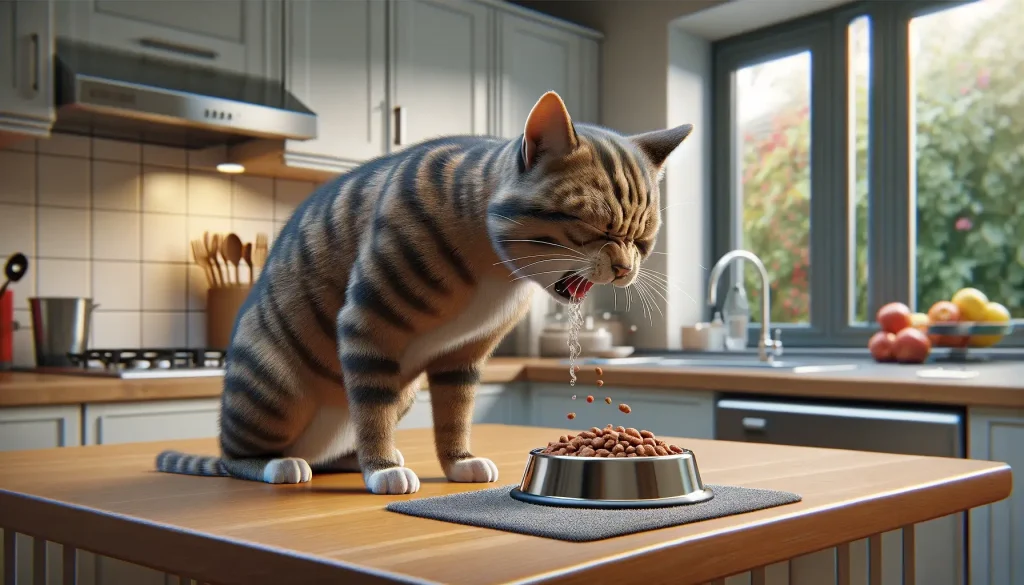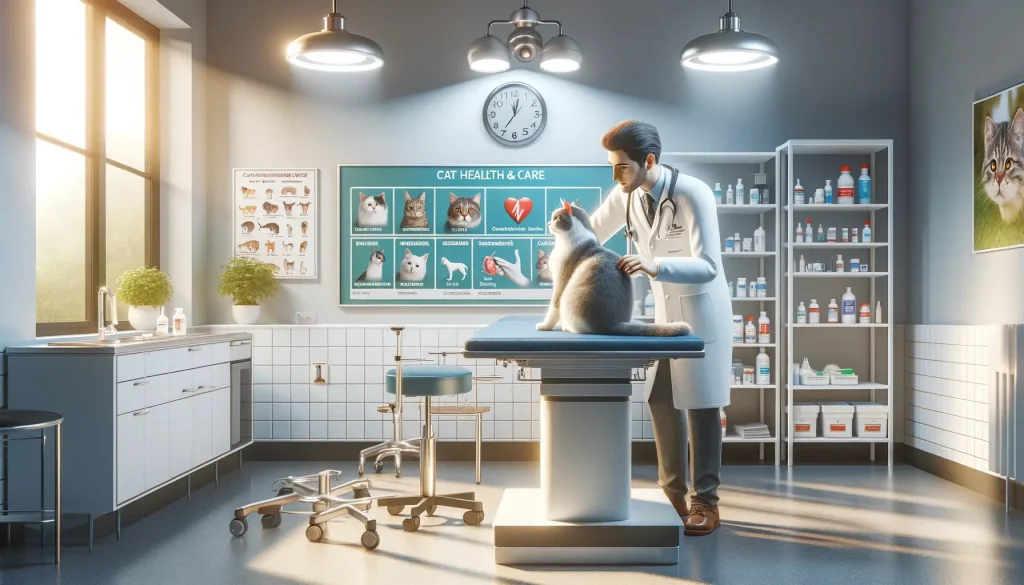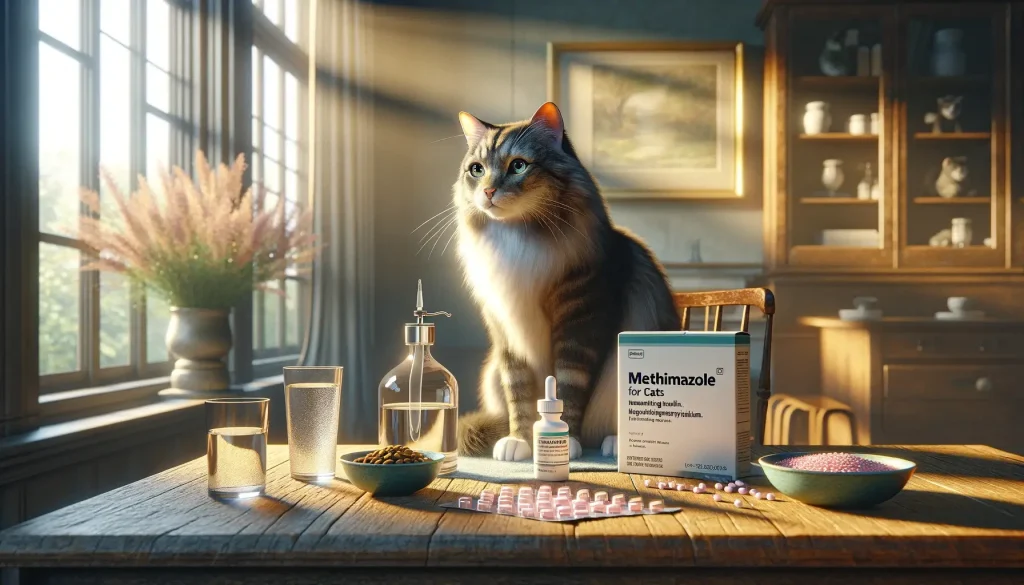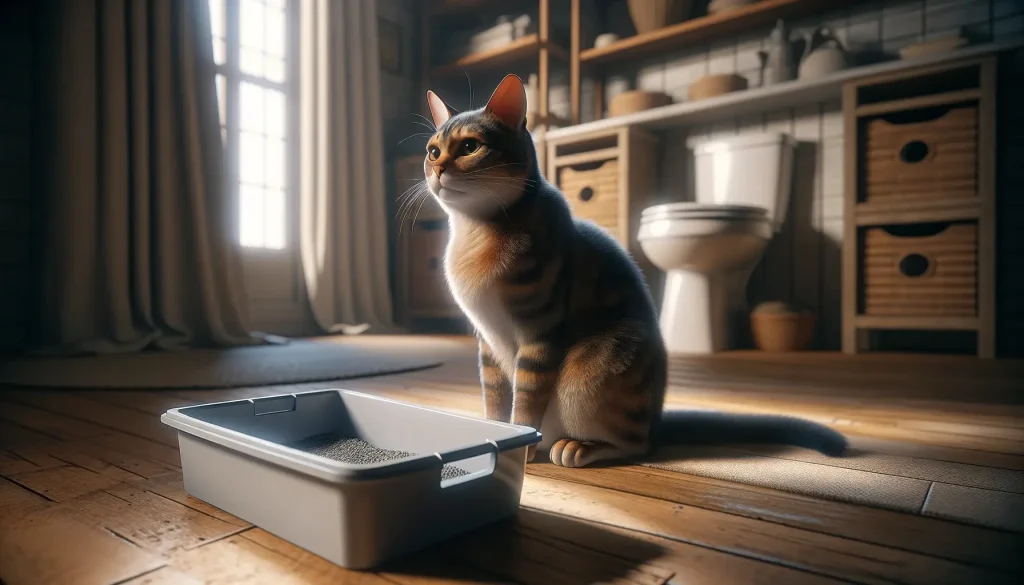
Gagging in cats is something that pet owners need to understand to provide the best care for their companions. Here’s a breakdown of common reasons why your cat might be gagging and how to address them:
- Hairballs: Regular grooming and high-fiber diets help prevent hairball formation by reducing ingested hair and facilitating its passage through the digestive system.
- Eating Too Fast: Slow feeder bowls encourage cats to eat slower, reducing air swallowing and discomfort in competitive feeding situations.
- Swallowing Foreign Objects: Ingesting non-food items can cause throat or digestive tract blockages, necessitating immediate veterinary intervention to prevent obstructions or internal injury.
- Nausea: Dietary changes or smaller, more frequent meals can mitigate nausea-induced gagging; persistent symptoms require a vet’s assessment to uncover underlying issues.
- Ingestion of Toxic Substances: Exposure to toxins prompts emergency veterinary care for treatments like induced vomiting or supportive recovery care.
- Heart Disease: Symptoms such as coughing, lethargy, and rapid breathing, alongside gagging, indicate fluid accumulation in or around the lungs, requiring urgent veterinary treatment.
- Kidney or Liver Disease: Increased thirst, a bloated abdomen, and lethargy, coupled with gagging, suggest toxin buildup, calling for tests and treatment for organ function.
- Allergies: Managing allergies involves removing allergens, possible dietary adjustments, and medication to alleviate throat inflammation and digestive upsets manifesting as gagging.
Many reasons can lead to your cat gagging, from relatively benign to serious health concerns. Knowing how to respond to each situation ensures your cat gets the care it needs without delay. But, beyond recognizing the signs, what steps can you take at home, and when should you absolutely consult with a veterinarian? Let’s explore.

Coughing vs Gagging
Distinguishing between coughing and gagging in cats is crucial for pet owners. Although they may seem similar, the causes and treatments differ significantly. Coughing is a reflex action designed to clear the airways of irritants, mucus, or foreign objects, while gagging often precedes vomiting and is a response to something stuck in the throat or nausea. Recognizing the signs of each can guide you on the right path to caring for your furry friend.
When a cat coughs, it might extend its neck and emit a dry, hacking sound, indicating an issue within the respiratory system, such as asthma or a respiratory infection. On the other hand, gagging involves retching motions and sounds, usually without producing anything, suggesting a problem related to digestion or physical obstruction.
Understanding these differences empowers pet owners to respond appropriately. For instance, a cat persistently coughing requires a veterinary check-up to assess for respiratory conditions, whereas gagging might prompt a review of dietary habits or the immediate environment for potential hazards.
At-Home vs. Vet Care
When your cat starts gagging, it’s crucial to know what you can handle at home and when it’s time to rush to the vet. This knowledge can save your cat’s life or spare them unnecessary stress. Here’s how to tell the difference:
- Home Care for Hairballs: If hairballs are the culprit, increase grooming sessions. Consider hairball-prevention cat foods or supplements.
- Prevent Fast Eating: Use slow feeder bowls to reduce gagging episodes caused by hurrying through meals.
- Dietary Changes for Nausea: Switch up their food or feeding times if upset stomachs are a concern. Small, frequent meals might help.
- Allergy Management: For allergies, identify triggers and remove them from your cat’s environment. Air purifiers can help.


However, some scenarios signal the need for professional help:
- Foreign Objects: If you suspect your cat has ingested something dangerous, don’t wait. Immediate vet intervention is necessary.
- Toxic Substances: Ingestion of poison requires a vet’s attention ASAP. Symptoms can escalate quickly without proper treatment.
- Symptoms of Diseases: Heart, kidney, or liver issues, indicated by symptoms like increased thirst, lethargy, or a bloated abdomen, demand veterinary care.
Remember, knowing the difference between coughing and gagging is vital. If you’re unsure or the gagging persists, it’s always safer to consult a vet. Your cat’s health isn’t something to guess about. When in doubt, professional advice is your best bet.
Preventive Strategies for Cat Gagging
Preventing cat gagging starts with understanding and proactive care. Here’s what you can do:
- Regular Grooming: Minimize hairballs, the common culprits of gagging. Brush your cat frequently to reduce the amount of hair they ingest.
- Slow Down Mealtime: Fast eating often leads to gagging. Slow feeder bowls encourage your cat to eat at a healthier pace.
- Monitor Play: Keep small objects and dangerous items out of reach. Cats are curious and may attempt to eat what they shouldn’t.
- Quality Diet: Offer a well-balanced diet. Consult your vet for food recommendations, especially if your cat has a sensitive stomach.
- Watch for Allergens: Identify potential allergies that might cause gagging. This can include certain foods, plants, or household chemicals.
- Regular Vet Check-ups: Routine health screenings help catch and manage conditions like kidney or liver disease early.
Understanding the difference between gagging and coughing is essential. Both could indicate various issues, and knowing when to seek vet care is critical. Implementing these preventive measures can greatly reduce the chance of gagging episodes and contribute to your cat’s overall health and comfort. If gagging persists, however, it’s important not to delay seeking professional advice.

When to be Concerned About Cat Gagging
Gagging in cats can appear routine, but knowing when it’s a sign of trouble is vital for any pet owner. It’s more than just an odd sound they make; it’s a signal your cat might need help.
Occasional gagging may not always spell danger. For instance, hairballs are a common reason behind this behavior, particularly in cats who groom themselves frequently. However, there are times when gagging is a red flag for more severe issues.
Eating too fast is another relatively mild reason your cat might be gagging. Cats that gulp their food down might ingest too much air or not chew their food adequately, leading to discomfort and gagging. A simple solution is to use slow feeder bowls that force your cat to take smaller bites and eat more slowly, effectively reducing episodes of gagging.
However, the scenario changes when a cat gags due to swallowing foreign objects. Objects like string or small toys can cause obstructions in your cat’s throat or digestive system, leading to serious health issues. This situation requires immediate veterinary attention to remove the obstruction and prevent further complications.
Nausea from various causes, including changes in diet, illnesses, or diseases, can also lead to gagging. Observation of your cat’s behavior and consultation with a vet can identify the root cause and appropriate changes to alleviate the issue.
Moreover, gagging could signal ingestion of toxic substances or severe conditions like heart disease, kidney, or liver disease. These conditions are accompanied by other symptoms such as increased thirst, lethargy, or a bloated abdomen. Each of these scenarios necessitates urgent veterinary care to address the underlying condition promptly.
Lastly, allergies that cause throat inflammation can lead your cat to retch and gag. Identifying and eliminating the allergen from your cat’s environment is crucial for relief.
Promptly addressing your cat’s gagging, especially when accompanied by other distressing symptoms, can significantly improve their wellbeing. Whether it requires changes at home or professional veterinary care, being proactive is the key. Keep an eye on your pet’s behavior, and when in doubt, always opt for a vet’s opinion to ensure your cat remains healthy and happy.
Beginner Guide to Raising Quail at Home
What are the Signs of a Dog Concussion?
What Causes Your Dog’s Ears to Smell Bad?
When your dog’s ears start to emit an unpleasant odor, it might leave you puzzled…
Methimazole Treatment for Cat Hyperthyroidism
Methimazole plays a crucial role in managing feline hyperthyroidism, a condition marked by an overactive…
Got Hummingbirds in your Backyard? Here’s How to Care for Them.
Why Does Your Cat Pee Outside the Litter Box?
Cat’s Litter Box Issues It’s not uncommon for cat owners to face the frustrating dilemma…




